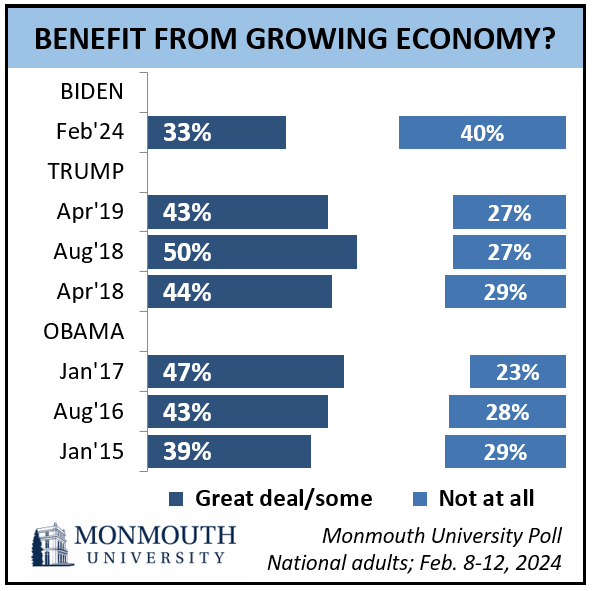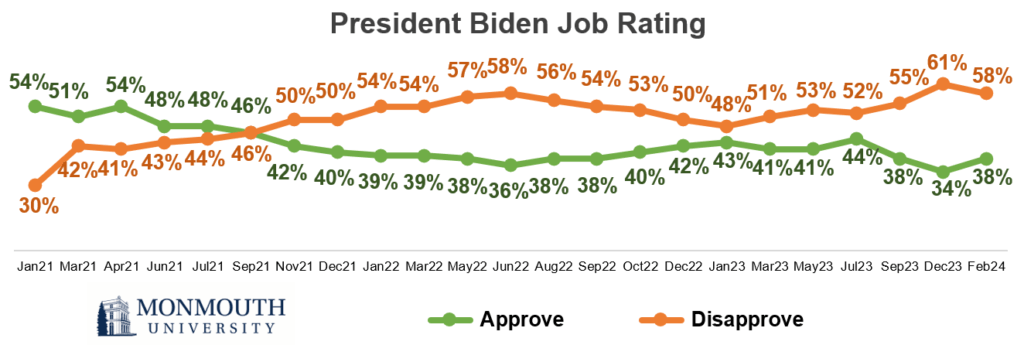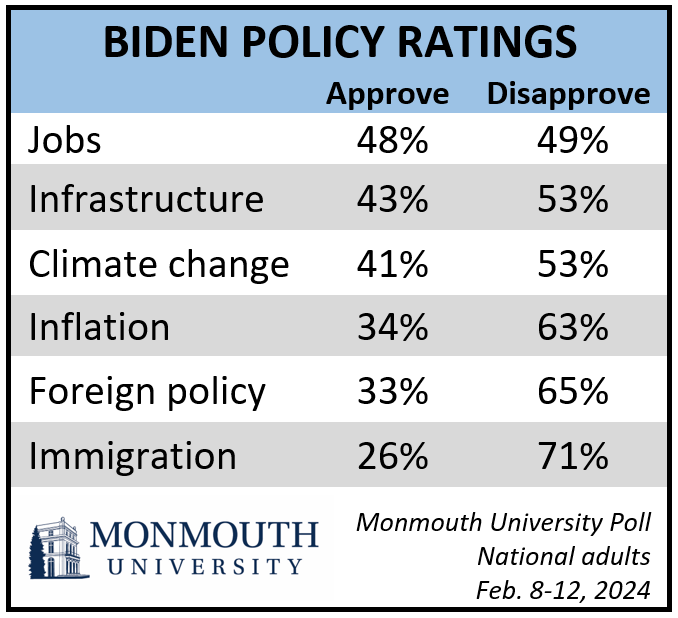West Long Branch, NJ – Just one-third of Americans feel they are benefitting from the current boom in the U.S. economy, a lower number than during the pre-Covid boom years. The Monmouth (“Mon-muth”) University Poll finds that just under half the public gives President Joe Biden credit for this upturn, but few say his policies are helping the middle class, especially compared to his predecessor. The poll also finds that disapproval of Congress has hit a nominal record for the past decade.

Recent economic indicators show the U.S. economy has been growing, including lower unemployment, higher productivity, and a high Dow Jones average. When asked about this economic upturn, about half of the public says Biden deserves credit for it (22% a great deal and 26% some credit) while half says he does not (14% not much and 36% not at all). Nine in 10 Democrats (89%) give the president at least some credit for the improving economy while just 1 in 10 Republicans (10%) say the same.
When asked whether their own family has been helped by this upturn, just one-third say they have personally benefited either a great deal (9%) or some (24%). At the opposite end of the spectrum, 40% of Americans say they have not benefited at all. These numbers were more positive when Monmouth asked this question before the pandemic. Between 2015 and 2019, the number of Americans who said their family benefited at least somewhat from national economic growth ranged from 39% (January 2015) to 50% (August 2018). Those who said they did not benefit at all was no higher than 29% (January 2015 and April 2018) and as low as 23% (January 2017).
Reports of how American families have been impacted by national economic growth has varied with partisanship over time. For example, the top-line results at the end of Barack Obama’s presidency and just past the halfway point in Donald Trump’s term were similar – 47% of the public reported at least some economic benefit in January 2017 and 43% said the same in April 2019. However, this overall stability masked significant partisan shifts between the two administrations. In the Obama era poll, 63% of Democrats said they were benefiting from national economic growth, while 42% of independents and 37% of Republicans said the same. Under Trump, just 27% of Democrats said they were benefiting from the economy, while it was higher among independents (44%) and especially Republicans (61%). According to the current poll, 61% of Democrats say they are benefiting from the economic growth during Biden’s term, but just 27% of independents and 14% of Republicans agree.
“When it comes to making a connection between the national economy and Americans’ own well-being, Biden is doing about as well as Obama did among his fellow Democrats and similar to how Trump performed among Republicans. The problem for Biden is he is doing decidedly worse than either of his two predecessors among independents,” said Patrick Murray, director of the independent Monmouth University Polling Institute.
Looking at how Biden’s policies have affected different economic groups shows that 16% of Americans say middle-class families in general have benefited a lot, 21% say poor families have benefited a lot, and 41% say wealthy families have benefited a lot. Conversely, 45% say middle-class families have not benefited at all from Biden’s policies, 40% say the same about poor families and 19% say the same about wealthy families. Compared to prior Monmouth polling, there has been some improvement for Biden on these numbers for middle-class and poor families, but the biggest difference has been in perceptions of how wealthy families have been affected. The number who say the wealthy have been helped a lot rose by 13 percentage points since 2022. Perceptions of how Biden has helped wealthy families is not quite as high as it was for Trump during his term (58% said the wealthy were benefiting a lot in 2019). More importantly, though, Biden’s numbers are slightly worse than Trump’s when it comes to helping middle-class families. About the same number say the middle class has been helped a lot by Biden as said the same for Trump in 2019 (18%), but the number who feel this group has not been helped at all is nine points higher for Biden than it was for his predecessor (36%). Also, when it comes to helping poor families, Biden does better than Trump, but much worse than Obama.
“The administration can beat the drum on all sorts of positive economic news. From the standpoint of Biden’s presidential campaign, however, if voters don’t think this bounty is reaching the middle class then that can become the economic ‘fact’ which matters most,” said Murray.
Public opinion of Biden’s overall job performance currently stands at 38% approve and 58% disapprove. This represents a slight improvement from Monmouth’s December poll which marked an all-time low for Biden since taking office (34% approve and 61% disapprove), but it continues an overall negative trend since last summer. Biden’s job rating went from net positive to net negative in the fall of 2021 and continued to worsen into the summer of 2022. It slowly started to rebound through the remainder of the year, but then grew more negative after January 2023 when he held a 43% approve and 48% disapprove rating. Currently, 79% of Democrats give Biden a positive job rating, but only 29% of independents and just 4% of Republicans do the same.

A majority of Americans disapprove of the way Biden has handled five different policy areas, while he earns a split decision on employment. Specifically, 48% approve and 49% disapprove of his handling of jobs and unemployment. This is somewhat better than his 42% approve and 53% disapprove rating on this policy area in December. The president’s policy ratings are more negative on transportation and energy infrastructure (43% approve, 53% disapprove) and climate change (41% approve, 53% disapprove). He gets decidedly poor ratings on handling inflation (34% approve, 63% disapprove), foreign policy (33% approve, 65% disapprove), and immigration (26% approve, 71% disapprove).
Biden’s approval number on inflation is six points better than in December (28%), while he has inched up 3 points on climate change (from 38%). His approval ratings on infrastructure and immigration are basically the same as they were two months ago (at 42% and 26%, respectively). Foreign policy was not asked in the December poll.

Among independents, 45% give Biden positive marks on handling jobs and unemployment, while 33% each approve of his performance on infrastructure and climate change. At least 8 in 10 Democrats approve of Biden’s handling of these three issues, while fewer than 1 in 10 Republicans say the same. Among Democrats, 71% approve of how Biden has handled inflation, 65% approve of his foreign policy efforts, and a bare majority (54%) approve of his work on immigration. No more than 1 in 4 independents and very few Republicans approve of Biden’s handling of these three issues.
On another topic, the U.S. Congress receives an abysmal job rating of 14% approve and 79% disapprove. This disapproval level is nominally the worst congressional rating since Monmouth started asking this question nationally in 2013. The current result just edges out statistically similar 78% disapproval ratings recorded in both June 2022 and August 2016. The current poll’s congressional approval rating matches the prior record low of 14% (from August 2016 and July 2013). Disapproval of Congress is widespread across all partisan groups, including 82% of Republicans, 82% of independents, and 74% of Democrats.
“One thing that Americans of all partisan stripes seem to agree upon is that Congress is broken,” said Murray.
In other poll results, Vice President Kamala Harris receives a job rating of 35% approve and 58% disapprove, which is basically unchanged from polls taken since the fall. Only 17% of the public says the country is going in the right direction, while 69% say it is on the wrong track. Democrats are split between saying the country is heading in the right (36%) or wrong (40%) direction, while nearly all Republicans (95%) and most independents (73%) feel things have gotten off on the wrong track.
The Monmouth University Poll was conducted by telephone from February 8 to 12, 2024 with 902 adults in the United States. The question results in this release have a margin of error of +/- 4.1 percentage points for the full sample. The poll was conducted by the Monmouth University Polling Institute in West Long Branch, NJ.
QUESTIONS AND RESULTS
(* Some columns may not add to 100% due to rounding.)
1.Do you approve or disapprove of the job Joe Biden is doing as president?
| Trend: | Feb. 2024 | Dec. 2023 | Sept. 2023 | July 2023 | May 2023 | March 2023 | Jan. 2023 | Dec. 2022 | Oct. 2022 | Sept. 2022 | Aug. 2022 | June 2022 | May 2022 | March 2022 | Jan. 2022 |
|---|---|---|---|---|---|---|---|---|---|---|---|---|---|---|---|
| Approve | 38% | 34% | 38% | 44% | 41% | 41% | 43% | 42% | 40% | 38% | 38% | 36% | 38% | 39% | 39% |
| Disapprove | 58% | 61% | 55% | 52% | 53% | 51% | 48% | 50% | 53% | 54% | 56% | 58% | 57% | 54% | 54% |
| (VOL) No opinion | 5% | 5% | 7% | 4% | 6% | 8% | 9% | 8% | 7% | 8% | 7% | 6% | 5% | 7% | 7% |
| (n) | (902) | (803) | (814) | (910) | (981) | (805) | (805) | (805) | (808) | (806) | (808) | (978) | (807) | (809) | (794) |
| Trend: Continued | Dec. 2021 | Nov. 2021 | Sept. 2021 | July 2021 | June 2021 | April 2021 | March 2021 | Jan. 2021 |
|---|---|---|---|---|---|---|---|---|
| Approve | 40% | 42% | 46% | 48% | 48% | 54% | 51% | 54% |
| Disapprove | 50% | 50% | 46% | 44% | 43% | 41% | 42% | 30% |
| (VOL) No opinion | 11% | 9% | 8% | 8% | 9% | 5% | 8% | 16% |
| (n) | (808) | (811) | (802) | (804) | (810) | (800) | (802) | (809) |
2.Do you approve or disapprove of the job Kamala Harris is doing as vice president?
| Trend: | Feb. 2024 | Dec. 2023 | Sept. 2023 | July 2023 | May 2023 | March 2023 |
|---|---|---|---|---|---|---|
| Approve | 35% | 35% | 36% | 40% | 37% | 36% |
| Disapprove | 58% | 57% | 56% | 52% | 52% | 53% |
| (VOL) No opinion | 7% | 8% | 8% | 7% | 11% | 12% |
| (n) | (902) | (803) | (814) | (910) | (981) | (805) |
3.Do you approve or disapprove of the job the U.S. Congress is doing?
| Trend: | Feb. 2024 | Dec. 2023 | Sept. 2023 | July 2023 | May 2023 | March 2023 | Jan. 2023 |
|---|---|---|---|---|---|---|---|
| Approve | 14% | 17% | 17% | 22% | 18% | 23% | 19% |
| Disapprove | 79% | 77% | 74% | 68% | 72% | 68% | 67% |
| (VOL) No opinion | 7% | 6% | 9% | 10% | 9% | 10% | 14% |
| (n) | (902) | (803) | (814) | (910) | (981) | (805) | (805) |
| Trend: Continued | Dec. 2022 | Oct. 2022 | Sept. 2022 | Aug. 2022 | June 2022 | May 2022 | March 2022 | Jan. 2022 | Dec. 2021 | Nov. 2021 | Sept. 2021 | July 2021 | June 2021 | April 2021 | March 2021 | Jan. 2021 |
|---|---|---|---|---|---|---|---|---|---|---|---|---|---|---|---|---|
| Approve | 26% | 23% | 23% | 17% | 15% | 15% | 21% | 19% | 23% | 18% | 22% | 23% | 21% | 35% | 30% | 35% |
| Disapprove | 62% | 69% | 66% | 74% | 78% | 77% | 71% | 74% | 66% | 70% | 65% | 62% | 65% | 56% | 59% | 51% |
| (VOL) No opinion | 12% | 8% | 11% | 9% | 7% | 8% | 8% | 6% | 11% | 12% | 13% | 15% | 15% | 9% | 11% | 14% |
| (n) | (805) | (808) | (806) | (808) | (978) | (807) | (809) | (794) | (808) | (811) | (802) | (804) | (810) | (800) | (802) | (809) |
| Trend: Continued | Nov. 2020 | Early June 2020 | May 2020 | April 2020 | Feb. 2020 | Jan. 2020 | Dec. 2019 | Nov. 2019 | Sept. 2019 | Aug. 2019 | June 2019 | May 2019 | April 2019 | March 2019 | Jan. 2019 |
|---|---|---|---|---|---|---|---|---|---|---|---|---|---|---|---|
| Approve | 23% | 22% | 32% | 32% | 20% | 24% | 22% | 23% | 21% | 17% | 19% | 20% | 24% | 23% | 18% |
| Disapprove | 64% | 69% | 55% | 55% | 69% | 62% | 65% | 64% | 68% | 71% | 69% | 71% | 62% | 68% | 72% |
| (VOL) No opinion | 13% | 9% | 13% | 13% | 11% | 14% | 13% | 13% | 11% | 13% | 12% | 9% | 14% | 9% | 10% |
| (n) | (810) | (807) | (808) | (857) | (902) | (903) | (903) | (908) | (1,161) | (800) | (751) | (802) | (801) | (802) | (805) |
| Trend: Continued | Nov. 2018 | Aug. 2018 | June 2018 | April 2018 | March 2018 | Jan. 2018 | Dec. 2017 | Sept. 2017 | Aug. 2017 | July 2017 | May 2017 | March 2017 | Jan. 2017 |
|---|---|---|---|---|---|---|---|---|---|---|---|---|---|
| Approve | 23% | 17% | 19% | 17% | 18% | 21% | 16% | 17% | 18% | 19% | 19% | 25% | 23% |
| Disapprove | 63% | 69% | 67% | 71% | 72% | 68% | 65% | 69% | 69% | 70% | 68% | 59% | 66% |
| (VOL) No opinion | 14% | 14% | 14% | 12% | 11% | 11% | 19% | 15% | 13% | 11% | 13% | 16% | 11% |
| (n) | (802) | (805) | (806) | (803) | (803) | (806) | (806) | (1,009) | (805) | (800) | (1,002) | (801) | (801) |
| Trend: Continued | Sept. 2016* | Aug. 2016* | June 2016* | March 2016 | Jan. 2016 | Dec. 2015 | Oct. 2015 | Sept. 2015 | Aug. 2015 | July 2015 | June 2015 | April 2015 | Jan. 2015 | Dec. 2014 | July 2013 |
|---|---|---|---|---|---|---|---|---|---|---|---|---|---|---|---|
| Trend: Continued | Sept. 2016* | Aug. 2016* | June 2016* | March 2016 | Jan. 2016 | Dec. 2015 | Oct. 2015 | Sept. 2015 | Aug. 2015 | July 2015 | June 2015 | April 2015 | Jan. 2015 | Dec. 2014 | July 2013 |
| Approve | 15% | 14% | 17% | 22% | 17% | 16% | 17% | 19% | 18% | 18% | 19% | 21% | 18% | 17% | 14% |
| Disapprove | 77% | 78% | 76% | 68% | 73% | 73% | 71% | 71% | 72% | 69% | 71% | 67% | 70% | 73% | 76% |
| (VOL) No opinion | 8% | 9% | 7% | 10% | 10% | 10% | 12% | 11% | 11% | 12% | 10% | 12% | 11% | 11% | 10% |
| (n) | (802) | (803) | (803) | (1,008) | (1,003) | (1,006) | (1,012) | (1,009) | (1,203) | (1,001) | (1,002) | (1,005) | (1,003) | (1,008) | (1,012) |
4.Would you say things in the country are going in the right direction, or have they gotten off on the wrong track?
| Trend: | Feb. 2024 | Dec. 2023 | Sept. 2023 | July 2023 | May 2023 | March 2023 | Jan. 2023 |
|---|---|---|---|---|---|---|---|
| Right direction | 17% | 20% | 17% | 25% | 16% | 22% | 24% |
| Wrong track | 69% | 69% | 68% | 68% | 74% | 72% | 73% |
| (VOL) Depends | 13% | 9% | 12% | 5% | 6% | 3% | 1% |
| (VOL) Don’t know | 1% | 2% | 2% | 3% | 4% | 3% | 2% |
| (n) | (902) | (803) | (814) | (910) | (981) | (805) | (805) |
| Trend: Continued | Dec. 2022 | Sept. 2022 | Aug. 2022 | June 2022 | May 2022 | March 2022 | Jan. 2022 | Dec. 2021 | Nov. 2021 | Sept. 2021 | July 2021 | June 2021 | April 2021 | March 2021 | Jan. 2021 |
|---|---|---|---|---|---|---|---|---|---|---|---|---|---|---|---|
| Right direction | 28% | 23% | 15% | 10% | 18% | 24% | 24% | 30% | 31% | 29% | 38% | 37% | 46% | 34% | 42% |
| Wrong track | 68% | 74% | 82% | 88% | 79% | 73% | 71% | 66% | 64% | 65% | 56% | 57% | 50% | 61% | 51% |
| (VOL) Depends | 2% | 2% | 1% | 1% | 2% | 1% | 3% | 1% | 2% | 4% | 3% | 3% | 2% | 4% | 3% |
| (VOL) Don’t know | 3% | 2% | 2% | 1% | 2% | 2% | 2% | 3% | 3% | 2% | 4% | 3% | 2% | 2% | 4% |
| (n) | (805) | (806) | (808) | (978) | (807) | (809) | (794) | (808) | (811) | (802) | (804) | (810) | (800) | (802) | (809) |
| Trend: Continued | Nov. 2020 | Early Sept. 2020 | Aug. 2020 | Late June 2020 | Early June 2020 | May 2020 | April 2020 | March 2020 | Feb. 2020 | Jan. 2020 |
|---|---|---|---|---|---|---|---|---|---|---|
| Right direction | 26% | 27% | 22% | 18% | 21% | 33% | 30% | 39% | 37% | 37% |
| Wrong track | 68% | 66% | 72% | 74% | 74% | 60% | 61% | 54% | 57% | 56% |
| (VOL) Depends | 4% | 4% | 4% | 5% | 4% | 4% | 5% | 4% | 6% | 6% |
| (VOL) Don’t know | 2% | 3% | 2% | 3% | 1% | 3% | 5% | 3% | 1% | 1% |
| (n) | (810) | (867) | (868) | (867) | (807) | (808) | (857) | (851) | (902) | (903) |
| Trend: Continued | Dec. 2019 | Nov. 2019 | Sept. 2019 | Aug. 2019 | June 2019 | May 2019 | April 2019 | March 2019 | Nov. 2018 | Aug. 2018 | June 2018 | April 2018 | March 2018 | Jan. 2018 |
|---|---|---|---|---|---|---|---|---|---|---|---|---|---|---|
| Right direction | 32% | 30% | 30% | 28% | 31% | 29% | 28% | 29% | 35% | 35% | 40% | 33% | 31% | 37% |
| Wrong track | 56% | 61% | 61% | 62% | 62% | 63% | 62% | 63% | 55% | 57% | 53% | 58% | 61% | 57% |
| (VOL) Depends | 8% | 7% | 6% | 8% | 6% | 4% | 7% | 6% | 7% | 6% | 3% | 5% | 6% | 3% |
| (VOL) Don’t know | 4% | 2% | 2% | 2% | 2% | 3% | 3% | 2% | 3% | 3% | 3% | 4% | 1% | 3% |
| (n) | (903) | (908) | (1,161) | (800) | (751) | (802) | (801) | (802) | (802) | (805) | (806) | (803) | (803) | (806) |
| Trend: Continued | Dec. 2017 | Aug. 2017 | May 2017 | March 2017 | Jan. 2017 | Aug. 2016* | Oct. 2015 | July 2015 | June 2015 | April 2015 | Dec. 2014 | July 2013 |
|---|---|---|---|---|---|---|---|---|---|---|---|---|
| Right direction | 24% | 32% | 31% | 35% | 29% | 30% | 24% | 28% | 23% | 27% | 23% | 28% |
| Wrong track | 66% | 58% | 61% | 56% | 65% | 65% | 66% | 63% | 68% | 66% | 69% | 63% |
| (VOL) Depends | 7% | 4% | 5% | 4% | 4% | 2% | 6% | 5% | 5% | 5% | 5% | 5% |
| (VOL) Don’t know | 3% | 5% | 3% | 5% | 2% | 3% | 4% | 3% | 3% | 2% | 3% | 4% |
| (n) | (806) | (805) | (1,002) | (801) | (801) | (803) | (1,012) | (1,001) | (1,002) | (1,005) | (1,008) | (1,012) |
5.Recent indicators have shown that the U.S. economy has been growing, including lower unemployment, higher productivity, and a high Dow Jones average. How much has your family benefited from this economic upturn – a great deal, some, not much, or not at all?
| Trend: | Feb. 2024 | April 2019 | Aug. 2018 | April 2018 | Jan. 2017 | Aug. 2016* | Jan. 2015 |
|---|---|---|---|---|---|---|---|
| Great deal | 9% | 12% | 18% | 12% | 12% | 11% | 8% |
| Some | 24% | 31% | 32% | 32% | 35% | 32% | 31% |
| Not much | 24% | 27% | 20% | 24% | 29% | 26% | 32% |
| Not at all | 40% | 27% | 27% | 29% | 23% | 28% | 29% |
| (VOL) Don’t know | 1% | 3% | 3% | 3% | 2% | 3% | 0% |
| (n) | (902) | (801) | (805) | (803) | (801) | (803) | (1,003) |
6.How much credit does President Biden deserve for this economic upturn – a great deal, some, not much, or not at all?
| Response: | Feb. 2024 |
|---|---|
| Great deal | 22% |
| Some | 26% |
| Not much | 14% |
| Not at all | 36% |
| (VOL) Don’t know | 2% |
| (n) | (902) |
7.How much have each of the following groups benefited from President Biden’s policies so far? [READ ITEM] – Have they benefited a lot, a little, or not at all? [ITEMS WERE ROTATED]
Middle class families
| Comparison: | Feb. 2024 | March 2023 | June 2022 | Nov. 2021 | July 2021 | June 2021 | Benefited under Trump | Jan. 2021 | April 2019 | April 2018 | Dec. 2017 | Benefited under Obama | Jan. 2017 | July 2013 |
|---|---|---|---|---|---|---|---|---|---|---|---|---|---|---|
| Benefited a lot | 16% | 10% | 7% | 14% | 21% | 19% | 32% | 18% | 14% | 11% | 24% | 12% | ||
| Benefited a little | 33% | 36% | 34% | 39% | 41% | 32% | 33% | 37% | 45% | 25% | 41% | 39% | ||
| Benefited not at all | 45% | 51% | 54% | 42% | 33% | 36% | 32% | 36% | 36% | 53% | 33% | 46% | ||
| (VOL) Don’t know | 7% | 3% | 5% | 5% | 5% | 14% | 3% | 9% | 5% | 11% | 2% | 2% | ||
| (n) | (902) | (805) | (978) | (811) | (804) | (810) | (809) | (801) | (803) | (806) | (801) | (1,012) |
Wealthy families
| Comparison: | Feb. 2024 | March 2023 | June 2022 | Nov. 2021 | July 2021 | Benefited under Trump | April 2019 | April 2018 | Benefited under Obama | Jan. 2017 | July 2013 |
|---|---|---|---|---|---|---|---|---|---|---|---|
| Benefited a lot | 41% | 28% | 28% | 25% | 22% | 58% | 57% | 29% | 35% | ||
| Benefited a little | 30% | 31% | 25% | 28% | 30% | 22% | 26% | 43% | 31% | ||
| Benefited not at all | 19% | 29% | 35% | 32% | 35% | 9% | 7% | 17% | 23% | ||
| (VOL) Don’t know | 9% | 12% | 12% | 14% | 14% | 11% | 10% | 10% | 10% | ||
| (n) | (902) | (805) | (978) | (811) | (804) | (801) | (803) | (801) | (1,012) |
Poor families
| Comparison: | Feb. 2024 | March 2023 | June 2022 | Nov. 2021 | July 2021 | Benefited under Trump | April 2019 | April 2018 | Benefited under Obama | Jan. 2017 | July 2013 |
|---|---|---|---|---|---|---|---|---|---|---|---|
| Benefited a lot | 21% | 17% | 13% | 22% | 31% | 14% | 12% | 39% | 20% | ||
| Benefited a little | 29% | 35% | 30% | 38% | 35% | 26% | 28% | 36% | 39% | ||
| Benefited not at all | 40% | 42% | 52% | 36% | 29% | 51% | 53% | 21% | 37% | ||
| (VOL) Don’t know | 10% | 6% | 5% | 4% | 5% | 9% | 7% | 4% | 4% | ||
| (n) | (902) | (805) | (978) | (811) | (804) | (801) | (803) | (801) | (1,012) |
8.Do you approve or disapprove of how Joe Biden has handled the following policy areas? [ITEMS WERE ROTATED]
| Trend: | Approve | Disapprove | (VOL) Don’t know | (n) |
|---|---|---|---|---|
| Jobs and unemployment | 48% | 49% | 3% | (902) |
| — Dec. 2023 | 42% | 53% | 5% | (803) |
| — July 2023 | 47% | 48% | 5% | (910) |
| — Sept. 2022 | 43% | 52% | 5% | (806) |
| Transportation and energy infrastructure | 43% | 53% | 4% | (902) |
| — Dec. 2023 | 42% | 52% | 7% | (803) |
| — July 2023 | 43% | 51% | 5% | (910) |
| — Sept. 2022 | 43% | 49% | 8% | (806) |
| Inflation | 34% | 63% | 3% | (902) |
| — Dec. 2023 | 28% | 68% | 5% | (803) |
| — July 2023 | 34% | 62% | 4% | (910) |
| — Sept. 2022 | 30% | 66% | 4% | (806) |
| Climate change | 41% | 53% | 6% | (902) |
| — Dec. 2023 | 38% | 54% | 8% | (803) |
| — July 2023 | n/a | n/a | n/a | n/a |
| — Sept. 2022 | 42% | 50% | 9% | (806) |
| Immigration | 26% | 71% | 3% | (902) |
| — Dec. 2023 | 26% | 69% | 5% | (803) |
| — July 2023 | n/a | n/a | n/a | n/a |
| — Sept. 2022 | 31% | 63% | 6% | (806) |
| Foreign policy | 33% | 65% | 2% | (902) |
| — Dec. 2023 | n/a | n/a | n/a | n/a |
| — July 2023 | n/a | n/a | n/a | n/a |
| — Sept. 2022 | n/a | n/a | n/a | n/a |
[Q9-17 & 35-37 held for future release.]
[Q18-34 previously released.]
METHODOLOGY
The Monmouth University Poll was sponsored and conducted by the Monmouth University Polling Institute from February 8 to 12, 2024 with a probability-based national random sample of 902 adults age 18 and older. Interviews were conducted in English, and included 183 live landline telephone interviews, 362 live cell phone interviews, and 357 online surveys via a cell phone text invitation. Telephone numbers were selected through a mix of random digit dialing and list-based sampling. Landline respondents were selected with a modified Troldahl-Carter youngest adult household screen. Interviewing services were provided by Braun Research, with sample obtained from Dynata (RDD, n= 557), Aristotle (list, n= 152) and a panel of prior Monmouth poll participants (n= 193). Monmouth is responsible for all aspects of the survey design, data weighting and analysis. The full sample is weighted for region, age, education, gender and race based on US Census information (ACS 2021 one-year survey). For results based on this sample, one can say with 95% confidence that the error attributable to sampling has a maximum margin of plus or minus 4.1 percentage points adjusted for sample design effects (1.56). Sampling error can be larger for sub-groups (see table below). In addition to sampling error, one should bear in mind that question wording and practical difficulties in conducting surveys can introduce error or bias into the findings of opinion polls.
Demographics (weighted)
Party (self-reported): 28% Republican, 40% Independent, 32% Democrat
Sex: 48% male, 51% female, 1% other
Age: 29% 18-34, 33% 35-54, 38% 55+
Race: 61% White, 12% Black, 17% Hispanic, 10% Asian/other
Education: 37% high school or less, 29% some college, 19% 4 year degree, 15% graduate degree
Click on pdf file link below for full methodology and crosstabs by key demographic groups.




